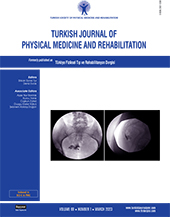Knowledge, attitude, and practice regarding stroke potential complications among stroke survivors` family members in Shiraz, Iran
2 Shiraz Geriatric Research Center, Shiraz University of Medical Sciences, Shiraz, Iran
3 Health Policy Research Center, Shiraz University of Medical Sciences, Shiraz, Iran
4 Student Research Committee, Shiraz University of Medical Sciences, Shiraz, Iran
5 Kerman Neuroscience Research Center, Institute of Neuropharmacology, Kerman University of Medical Sciences, Kerman, Iran DOI : 10.5606/tftrd.2022.9512 Objectives: This study aimed to evaluate stroke survivors' family members' knowledge, attitude, and practice about these sequelae.
Patients and methods: In this cross-sectional survey, 105 family members (57 males, 48 females; mean age: 48.3±9.7 years; range 18 to 60 years) of stroke survivors were examined via a self-structured questionnaire between September 2019 and January 2020. Patients` medical characteristics, as well as participants' sociodemographic and opinions regarding studying variables, were surveyed.
Results: The participants were mostly married and had relatively high scores in knowledge, attitude, and practice questionnaires. We found a significant correlation between participants` knowledge and practice. Moreover, data analysis revealed significantly higher knowledge scores in the employed participants and higher practice scores in the urban population. Furthermore, the relationship of patients with their family members can affect their attitude toward stroke complications.
Conclusion: This study has revealed that caregivers in rural areas with lower education levels are less knowledgeable about potential stroke complications, and subsequently, the patients are more vulnerable to those sequelae. Stakeholders should consider these groups their priorities in education and empowerment processes for stroke survivors` caregivers.
Keywords : Attitude, caregiver, knowledge, practice, rehabilitation, stroke

















